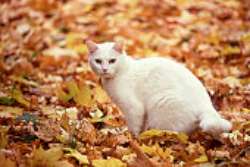
Feline Diarrhea is one of the more common illnesses and indicates a problem in the intestines or colon. It is a symptom of some underlying disease. It can be caused by a viral or bacterial infection, it could be a disease of the intestine or colon wall; for example, inflammatory bowel disease. Other causes include foreign body ingestion or dietary indiscretion. Diarrhea can be mild and self-limiting; or debilitating and life threatening.
In the case of an acute attack of diarrhea knowing the cat's activities and whereabouts previous to the outbreak of diarrhea may help determine the cause. If the cat has been to a boarding kennel, grooming parlour, or even run away for a few hours, it may have contacted a virus from another animal. If the cat has a history of getting in the garbage it may suggest the problem is due to an intestinal foreign body or ingestion of spoiled food. The history may suggest the problem is a simple one due to a different brand of cat food, or too many table scraps.
However if the problem has been going on for a long time this may indicate a chronic condition such as inflammatory bowel disease.
Considering its complex architecture, the delicate interplay of its components with other organs and glands in the digestive system, and the many challenging and vitally necessary tasks it must constantly perform, it's no wonder that things might go wrong with the feline digestive tract now and then. Digestive system disorders in general are among the most frequently observed health problems in cats. Many of these disorders are primarily associated with organs such as the liver, pancreas and gall bladder--all of which play a crucial role in the digestive system.
Put your cat on simple raw food diet with small amount of slippery elm powder (1/4 teaspoon) mixed through it. In the gastro-intestinal tract, Slippery Elm acts directly. Its mucilage content coats, soothes, and lubricates the mucus membranes lining the digestive tract. It is high in fibre, and so helps normalize intestinal action; it can be used to relieve both diarrhea and constipation.
Anitra Frazier gives the following recipe for Slippery Elm Bark syrup in her book, The New Natural Cat, which applies equally well to our canine companions when adjusted for weight: Into a small saucepan place 1/2 cup cold water and 1 teaspoon powdered slippery elm bark. Whip with a fork. Bring to simmer over low flame, stirring constantly. Simmer 1 or 2 minutes or until slightly thickened. Cool and refrigerate. Keeps 7 or 8 days. Give a teaspoon of syrup (5 cc) for an average-size cat (again, about 10 pounds) 5 minutes before a meal to minimize diarrhea.
My mix includes the following herbs Slippery Elm, Chamomile, St Mary's, Vervain, Yarrow, Passion Flower, Blue Flag along with the Bach Flowers Rescue Remedy, Scleranthus, Wild Oat and Aspen.
Feline Irritable Bowel Syndrome

